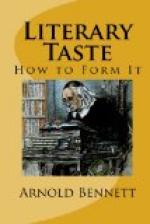It is a course of study that I am suggesting to you. It means a certain amount of sustained effort. It means slightly more resolution, more pertinacity, and more expenditure of brain-tissue than are required for reading a newspaper. It means, in fact, “work.” Perhaps you did not bargain for work when you joined me. But I do not think that the literary taste can be satisfactorily formed unless one is prepared to put one’s back into the affair. And I may prophesy to you, by way of encouragement, that, in addition to the advantages of familiarity with masterpieces, of increased literary knowledge, and of a wide introduction to the true bookish atmosphere and “feel” of things, which you will derive from a comprehensive study of Charles Lamb, you will also be conscious of a moral advantage—the very important and very inspiring advantage of really “knowing something about something.” You will have achieved a definite step; you will be proudly aware that you have put yourself in a position to judge as an expert whatever you may hear or read in the future concerning Charles Lamb. This legitimate pride and sense of accomplishment will stimulate you to go on further; it will generate steam. I consider that this indirect moral advantage even outweighs, for the moment, the direct literary advantages.
Now, I shall not shut my eyes to a possible result of your diligent intercourse with Charles Lamb. It is possible that you may be disappointed with him. It is—shall I say?—almost probable that you will be disappointed with him, at any rate partially. You will have expected more joy in him than you have received. I have referred in a previous chapter to the feeling of disappointment which often comes from first contacts with the classics. The neophyte is apt to find them—I may as well out with the word—dull. You may have found Lamb less diverting, less interesting, than you hoped. You may have had to whip yourself up again and again to the effort of reading him. In brief, Lamb has not, for you, justified his terrific reputation. If a classic is a classic because it gives pleasure to succeeding generations




